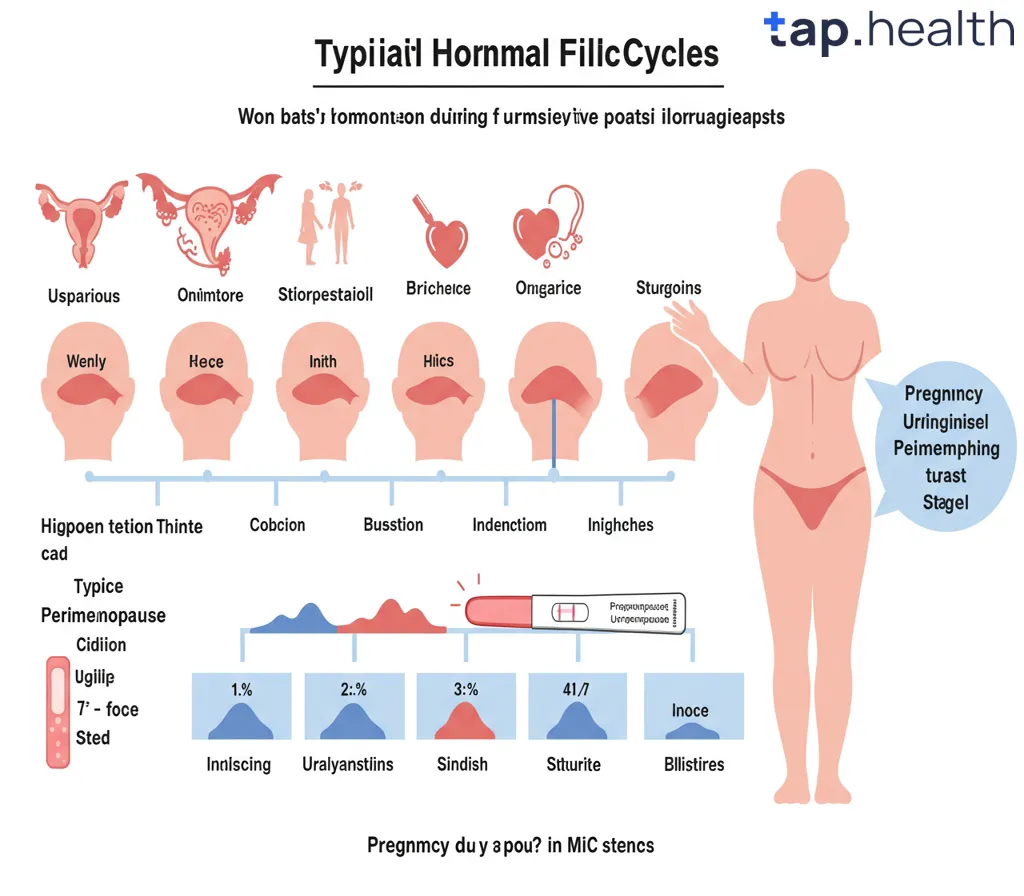Perimenopause is a natural phase in a woman’s life that marks the transition toward menopause. During this time, many women experience various changes in their menstrual cycles and hormone levels. One of the most confusing issues some women face during perimenopause is a positive pregnancy test when they are no longer expecting. This can cause a lot of confusion and concern.
So, can perimenopause cause a positive pregnancy test? In this detailed guide, we’ll explore the relationship between perimenopause and pregnancy tests. We’ll answer common questions, explain the reasons behind false positives, and help you understand what might be going on with your body.
What is Perimenopause?
Before we dive into whether perimenopause can cause a positive pregnancy test, it’s essential to understand what perimenopause is and how it affects the body.
The Basics of Perimenopause
Perimenopause refers to the transitional phase leading up to menopause. It typically starts in a woman’s 40s but can begin earlier for some women. During this phase, the ovaries gradually produce less estrogen, leading to hormonal changes that cause irregular periods, hot flashes, mood swings, and other symptoms.
How Long Does Perimenopause Last?
Perimenopause can last anywhere from 4 to 10 years, with the average duration being about 4 years. Once a woman has gone 12 consecutive months without a period, she officially reaches menopause. Perimenopause is simply the time before that final year.
Can Perimenopause Cause a Positive Pregnancy Test?
This is the main question many women have when they experience a positive pregnancy test during perimenopause. The short answer is yes, perimenopause can cause a positive pregnancy test, but not for the reasons you might think.
Why Would a Pregnancy Test Be Positive During Perimenopause?
A pregnancy test detects the hormone human chorionic gonadotropin (hCG), which is produced when a fertilized egg implants in the uterus. Normally, hCG levels rise during pregnancy and are detectable by home pregnancy tests.
However, perimenopause can cause hormonal changes that may lead to a false positive result on a pregnancy test. Here’s why:
1. Hormonal Fluctuations in Perimenopause
During perimenopause, estrogen and progesterone levels fluctuate, which can cause changes in your menstrual cycle. This fluctuation can sometimes result in increased levels of hCG in the body. While this hormone is usually associated with pregnancy, it can also be present at low levels in perimenopausal women due to hormonal imbalances. These fluctuating hormone levels might cause a pregnancy test to show a positive result, even though you’re not actually pregnant.
2. False Positive Pregnancy Test
A false positive pregnancy test means that the test shows a positive result even though you are not pregnant. False positives can happen for several reasons, especially during perimenopause. In addition to hormone fluctuations, other factors that can cause false positives include:
- Certain medications: Some medications, like those used for fertility treatments or hormone replacement therapy, can interfere with pregnancy test results.
- Medical conditions: Conditions such as ovarian cysts, fibroids, or pituitary gland disorders can cause hormonal imbalances that affect pregnancy test results.
- Chemical pregnancy: This is when an egg is fertilized but doesn’t fully implant in the uterus, leading to a short-lived increase in hCG levels. This can cause a positive pregnancy test but no actual pregnancy.
3. Perimenopausal Symptoms Resembling Pregnancy
Some of the symptoms of perimenopause are similar to those of early pregnancy, which can further confuse the situation. For example, perimenopausal women may experience:
- Missed or irregular periods: Both perimenopause and early pregnancy can lead to missed periods.
- Breast tenderness: This is common in both perimenopause and pregnancy.
- Fatigue and mood swings: Both conditions can cause these symptoms due to hormonal fluctuations.
- Morning sickness: Nausea and vomiting are typical pregnancy symptoms, but they can also occur in perimenopause due to changes in estrogen and progesterone levels.
These overlapping symptoms can make it difficult to tell whether you’re pregnant or simply going through the changes associated with perimenopause.
Can Perimenopause Mimic Pregnancy?
As mentioned earlier, many of the symptoms of perimenopause are similar to those of pregnancy. This can make it even harder to distinguish between the two. Here are some of the symptoms that can mimic pregnancy during perimenopause:
1. Irregular Periods
Irregular periods are a hallmark of perimenopause. Some women experience skipped periods or periods that are much heavier or lighter than usual. This can easily be mistaken for early pregnancy or implantation bleeding.
2. Mood Swings and Fatigue
Mood swings and fatigue are common during perimenopause due to hormonal changes. These symptoms are also prevalent in early pregnancy, leading some women to think they might be pregnant when, in fact, they are simply experiencing perimenopausal symptoms.
3. Breast Tenderness
Many women experience sore or swollen breasts during perimenopause. This is due to the fluctuations in estrogen levels, but it’s also a common symptom of early pregnancy. This can be another reason why a pregnancy test might show a positive result during perimenopause.
What to Do If You Get a Positive Pregnancy Test During Perimenopause
If you’re in perimenopause and get a positive pregnancy test, it’s important to take the following steps:
1. Take Another Test
If your first test is positive, it’s a good idea to take a second test to confirm the result. It’s possible that the first test could have been a false positive. Be sure to follow the instructions carefully when using the test.
2. Consult Your Doctor
If you still have questions or concerns after taking another test, it’s time to consult your healthcare provider. They can conduct blood tests to measure your hCG levels and confirm whether or not you are pregnant. Blood tests are more accurate than home pregnancy tests and can help rule out other causes of a positive result.
3. Consider Other Factors
If the pregnancy test is negative but you’re still experiencing pregnancy-like symptoms, it’s important to discuss these with your doctor. Hormonal imbalances, ovarian cysts, and other medical conditions can cause symptoms that resemble pregnancy.
Can Other Medical Conditions Cause a Positive Pregnancy Test During Perimenopause?
In addition to perimenopause, several other medical conditions can cause a false positive pregnancy test. Some of these conditions include:
1. Ovarian Cysts
Certain types of ovarian cysts can produce hormones that might lead to a positive pregnancy test. If you have ovarian cysts, they can cause hormone imbalances that interfere with pregnancy test results.
2. Pituitary Tumors
Pituitary tumors, though rare, can cause the pituitary gland to produce hormones that affect the menstrual cycle and can cause a false positive pregnancy test. These tumors may lead to an overproduction of hCG.
3. Fertility Treatments
If you are undergoing fertility treatments, such as those that involve hCG injections to trigger ovulation, this can also lead to a positive pregnancy test result, even if you are not pregnant.
FAQ on Can Perimenopause Cause a Positive Pregnancy Test?
Can perimenopause cause a positive pregnancy test?
Yes, perimenopause can cause a positive pregnancy test due to hormonal fluctuations, which can increase levels of hCG in the body. This can lead to a false positive result on the test.
Why would a pregnancy test be positive during perimenopause?
A pregnancy test may be positive during perimenopause because of fluctuating hormone levels, which can result in a small increase in hCG. Other causes of false positives include medical conditions or certain medications.
Can perimenopause cause pregnancy-like symptoms?
Yes, perimenopause can cause symptoms that resemble pregnancy, such as missed periods, breast tenderness, fatigue, and mood swings. This can make it difficult to distinguish between perimenopause and early pregnancy.
What should I do if I get a positive pregnancy test during perimenopause?
If you get a positive pregnancy test during perimenopause, take another test to confirm. If the result is still positive, consult your doctor for a blood test to accurately determine if you are pregnant.
Can ovarian cysts cause a positive pregnancy test during perimenopause?
Yes, certain ovarian cysts can cause hormone imbalances that lead to a false positive pregnancy test. If you have ovarian cysts, it’s important to speak with your healthcare provider about your symptoms.
Conclusion
In conclusion, perimenopause can cause a positive pregnancy test due to hormonal changes that affect hCG levels. However, it’s important to understand that a positive result during perimenopause is often a false positive. If you’re experiencing symptoms that seem like pregnancy, it’s essential to take another test and consult with your doctor for a definitive answer. By understanding the relationship between perimenopause and pregnancy tests, you can make informed decisions about your health and seek appropriate medical advice.



